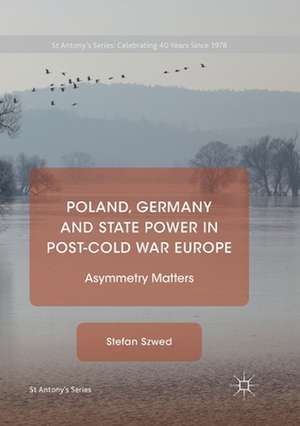Poland, Germany and State Power in Post-Cold War Europe: Asymmetry Matters: St Antony's Series
Autor Stefan Szweden Limba Engleză Paperback – 10 dec 2019
| Toate formatele și edițiile | Preț | Express |
|---|---|---|
| Paperback (1) | 526.35 lei 6-8 săpt. | |
| Palgrave Macmillan UK – 10 dec 2019 | 526.35 lei 6-8 săpt. | |
| Hardback (1) | 701.06 lei 6-8 săpt. | |
| Palgrave Macmillan UK – 12 oct 2018 | 701.06 lei 6-8 săpt. |
Din seria St Antony's Series
-
 Preț: 304.38 lei
Preț: 304.38 lei - 15%
 Preț: 519.86 lei
Preț: 519.86 lei - 18%
 Preț: 895.27 lei
Preț: 895.27 lei - 15%
 Preț: 647.27 lei
Preț: 647.27 lei - 18%
 Preț: 891.33 lei
Preț: 891.33 lei - 20%
 Preț: 939.86 lei
Preț: 939.86 lei - 18%
 Preț: 687.06 lei
Preț: 687.06 lei -
 Preț: 263.28 lei
Preț: 263.28 lei - 15%
 Preț: 640.37 lei
Preț: 640.37 lei - 15%
 Preț: 644.63 lei
Preț: 644.63 lei -
 Preț: 391.22 lei
Preț: 391.22 lei - 15%
 Preț: 644.18 lei
Preț: 644.18 lei - 15%
 Preț: 646.62 lei
Preț: 646.62 lei -
 Preț: 338.31 lei
Preț: 338.31 lei - 15%
 Preț: 643.48 lei
Preț: 643.48 lei - 15%
 Preț: 643.34 lei
Preț: 643.34 lei - 15%
 Preț: 640.55 lei
Preț: 640.55 lei -
 Preț: 389.11 lei
Preț: 389.11 lei - 15%
 Preț: 641.20 lei
Preț: 641.20 lei - 15%
 Preț: 639.08 lei
Preț: 639.08 lei - 15%
 Preț: 640.71 lei
Preț: 640.71 lei - 18%
 Preț: 1384.88 lei
Preț: 1384.88 lei - 15%
 Preț: 641.85 lei
Preț: 641.85 lei - 15%
 Preț: 641.53 lei
Preț: 641.53 lei - 15%
 Preț: 642.51 lei
Preț: 642.51 lei - 15%
 Preț: 642.83 lei
Preț: 642.83 lei - 15%
 Preț: 643.99 lei
Preț: 643.99 lei - 15%
 Preț: 647.27 lei
Preț: 647.27 lei -
 Preț: 390.08 lei
Preț: 390.08 lei - 18%
 Preț: 783.50 lei
Preț: 783.50 lei - 15%
 Preț: 641.03 lei
Preț: 641.03 lei - 18%
 Preț: 943.88 lei
Preț: 943.88 lei - 15%
 Preț: 641.85 lei
Preț: 641.85 lei - 15%
 Preț: 641.38 lei
Preț: 641.38 lei -
 Preț: 385.47 lei
Preț: 385.47 lei -
 Preț: 338.31 lei
Preț: 338.31 lei -
 Preț: 389.31 lei
Preț: 389.31 lei - 15%
 Preț: 641.03 lei
Preț: 641.03 lei - 18%
 Preț: 727.00 lei
Preț: 727.00 lei - 15%
 Preț: 640.88 lei
Preț: 640.88 lei -
 Preț: 448.82 lei
Preț: 448.82 lei - 18%
 Preț: 946.24 lei
Preț: 946.24 lei -
 Preț: 389.88 lei
Preț: 389.88 lei - 15%
 Preț: 643.00 lei
Preț: 643.00 lei - 15%
 Preț: 639.25 lei
Preț: 639.25 lei - 18%
 Preț: 948.61 lei
Preț: 948.61 lei - 15%
 Preț: 643.00 lei
Preț: 643.00 lei
Preț: 526.35 lei
Preț vechi: 619.24 lei
-15% Nou
Puncte Express: 790
Preț estimativ în valută:
100.73€ • 104.06$ • 83.83£
100.73€ • 104.06$ • 83.83£
Carte tipărită la comandă
Livrare economică 25 martie-08 aprilie
Preluare comenzi: 021 569.72.76
Specificații
ISBN-13: 9781349959280
ISBN-10: 1349959286
Pagini: 306
Ilustrații: XV, 306 p. 3 illus.
Dimensiuni: 148 x 210 mm
Greutate: 0.39 kg
Ediția:Softcover reprint of the original 1st ed. 2019
Editura: Palgrave Macmillan UK
Colecția Palgrave Macmillan
Seria St Antony's Series
Locul publicării:London, United Kingdom
ISBN-10: 1349959286
Pagini: 306
Ilustrații: XV, 306 p. 3 illus.
Dimensiuni: 148 x 210 mm
Greutate: 0.39 kg
Ediția:Softcover reprint of the original 1st ed. 2019
Editura: Palgrave Macmillan UK
Colecția Palgrave Macmillan
Seria St Antony's Series
Locul publicării:London, United Kingdom
Cuprins
Chapter One - Introduction.- Chapter Two - Community of Asymmetries: A Typology.- Chapter Three - A Tale of Two Allies: Poland, Germany and the New Transatlantic Order.- Chapter Four - Disunity in Diversity: Constitutional Treaty and the QMV.- Chapter Five - Disquiet in the East: Relations with Russia and the Neighbours.- Chapter Six - Power (grid) Politics: Poland, Germany and European Energy Security.- Chapter Seven - Conclusion.
Notă biografică
Stefan Szwed is Research Associate at the Centre for International Studies at the Department of Politics and International Relations and Senior Common Room Member at St Antony’s College, University of Oxford, UK. His research interests focus on Polish and German foreign policies, European integration and democratic transitions. He was Mairie de Paris Visiting Fellow at the Centre de Recherches internationales at Sciences Po, Paris.
Textul de pe ultima copertă
This book examines the post-Cold War Polish-German relationship and the puzzling rise of foreign and security policy differences between the two states during the 2000s. Through an investigation of four policy issues – NATO’s out-of-area mandate, European Constitution and the division of voting power in the Council, relations with Russia and the eastern neighbours, as well as EU energy policy – the author identifies the roots of their conflict in a structure of material, spatial and temporal asymmetries. Rather than treat them as currency, however, he explores the less conspicuous ways in which power is exercised and structure matters inside a community governed by shared rules and norms. In pursuing its research question, theoretical work, historical reconstructions and empirical analyses, the book combines security studies, transatlantic relations, European integration, and Polish and German politics with general theorizing and conceptual grounding in international relations and political science.
Caracteristici
Offers a detailed and wide-ranging analysis of post-Cold War relations between Germany and the emergent middle-power Poland Compares German and Polish foreign and security policies Contributes to topical debates on Germany and Poland's respective positions in Europe, EU integration, EU security policy, and the EU and Russia
